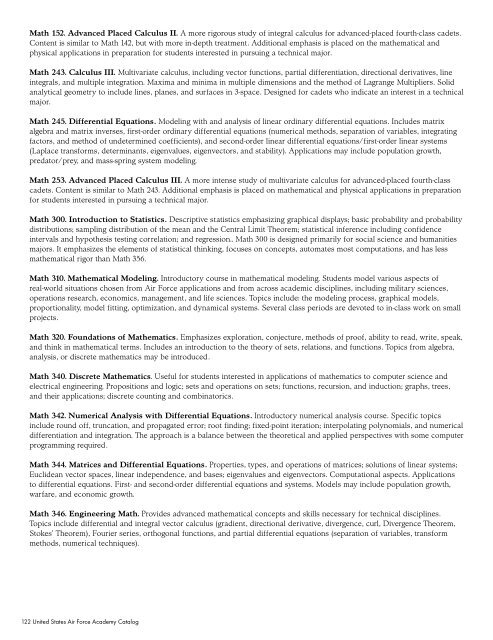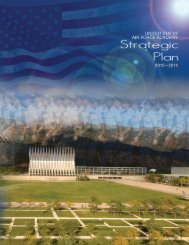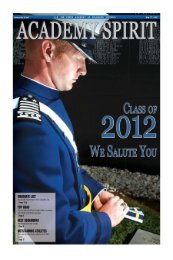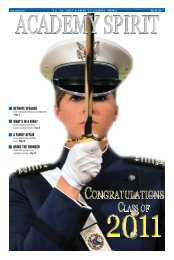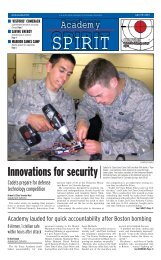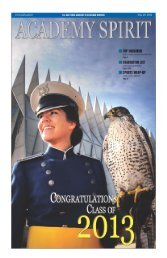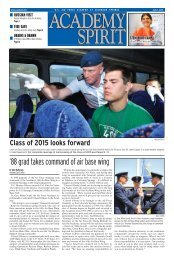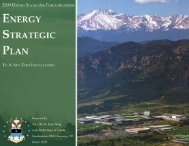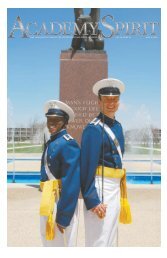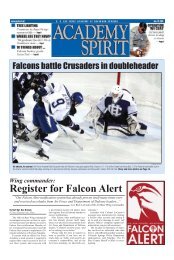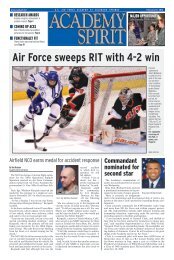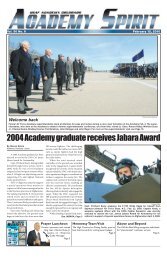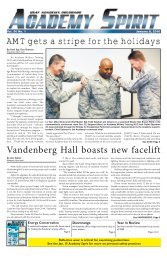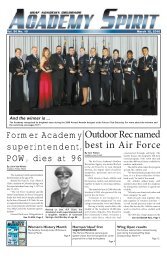2008-2009 Catalog - United States Air Force Academy
2008-2009 Catalog - United States Air Force Academy
2008-2009 Catalog - United States Air Force Academy
You also want an ePaper? Increase the reach of your titles
YUMPU automatically turns print PDFs into web optimized ePapers that Google loves.
Math 152. Advanced Placed Calculus II. A more rigorous study of integral calculus for advanced-placed fourth-class cadets.<br />
Content is similar to Math 142, but with more in-depth treatment. Additional emphasis is placed on the mathematical and<br />
physical applications in preparation for students interested in pursuing a technical major.<br />
Math 243. Calculus III. Multivariate calculus, including vector functions, partial differentiation, directional derivatives, line<br />
integrals, and multiple integration. Maxima and minima in multiple dimensions and the method of Lagrange Multipliers. Solid<br />
analytical geometry to include lines, planes, and surfaces in 3-space. Designed for cadets who indicate an interest in a technical<br />
major.<br />
Math 245. Differential Equations. Modeling with and analysis of linear ordinary differential equations. Includes matrix<br />
algebra and matrix inverses, first-order ordinary differential equations (numerical methods, separation of variables, integrating<br />
factors, and method of undetermined coefficients), and second-order linear differential equations/first-order linear systems<br />
(Laplace transforms, determinants, eigenvalues, eigenvectors, and stability). Applications may include population growth,<br />
predator/prey, and mass-spring system modeling.<br />
Math 253. Advanced Placed Calculus III. A more intense study of multivariate calculus for advanced-placed fourth-class<br />
cadets. Content is similar to Math 243. Additional emphasis is placed on mathematical and physical applications in preparation<br />
for students interested in pursuing a technical major.<br />
Math 300. Introduction to Statistics. Descriptive statistics emphasizing graphical displays; basic probability and probability<br />
distributions; sampling distribution of the mean and the Central Limit Theorem; statistical inference including confidence<br />
intervals and hypothesis testing correlation; and regression.. Math 300 is designed primarily for social science and humanities<br />
majors. It emphasizes the elements of statistical thinking, focuses on concepts, automates most computations, and has less<br />
mathematical rigor than Math 356.<br />
Math 310. Mathematical Modeling. Introductory course in mathematical modeling. Students model various aspects of<br />
real-world situations chosen from <strong>Air</strong> <strong>Force</strong> applications and from across academic disciplines, including military sciences,<br />
operations research, economics, management, and life sciences. Topics include: the modeling process, graphical models,<br />
proportionality, model fitting, optimization, and dynamical systems. Several class periods are devoted to in-class work on small<br />
projects.<br />
Math 320. Foundations of Mathematics. Emphasizes exploration, conjecture, methods of proof, ability to read, write, speak,<br />
and think in mathematical terms. Includes an introduction to the theory of sets, relations, and functions. Topics from algebra,<br />
analysis, or discrete mathematics may be introduced.<br />
Math 340. Discrete Mathematics. Useful for students interested in applications of mathematics to computer science and<br />
electrical engineering. Propositions and logic; sets and operations on sets; functions, recursion, and induction; graphs, trees,<br />
and their applications; discrete counting and combinatorics.<br />
Math 342. Numerical Analysis with Differential Equations. Introductory numerical analysis course. Specific topics<br />
include round off, truncation, and propagated error; root finding; fixed-point iteration; interpolating polynomials, and numerical<br />
differentiation and integration. The approach is a balance between the theoretical and applied perspectives with some computer<br />
programming required.<br />
Math 344. Matrices and Differential Equations. Properties, types, and operations of matrices; solutions of linear systems;<br />
Euclidean vector spaces, linear independence, and bases; eigenvalues and eigenvectors. Computational aspects. Applications<br />
to differential equations. First- and second-order differential equations and systems. Models may include population growth,<br />
warfare, and economic growth.<br />
Math 346. Engineering Math. Provides advanced mathematical concepts and skills necessary for technical disciplines.<br />
Topics include differential and integral vector calculus (gradient, directional derivative, divergence, curl, Divergence Theorem,<br />
Stokes’ Theorem), Fourier series, orthogonal functions, and partial differential equations (separation of variables, transform<br />
methods, numerical techniques).<br />
122 <strong>United</strong> <strong>States</strong> <strong>Air</strong> <strong>Force</strong> <strong>Academy</strong> <strong>Catalog</strong>


